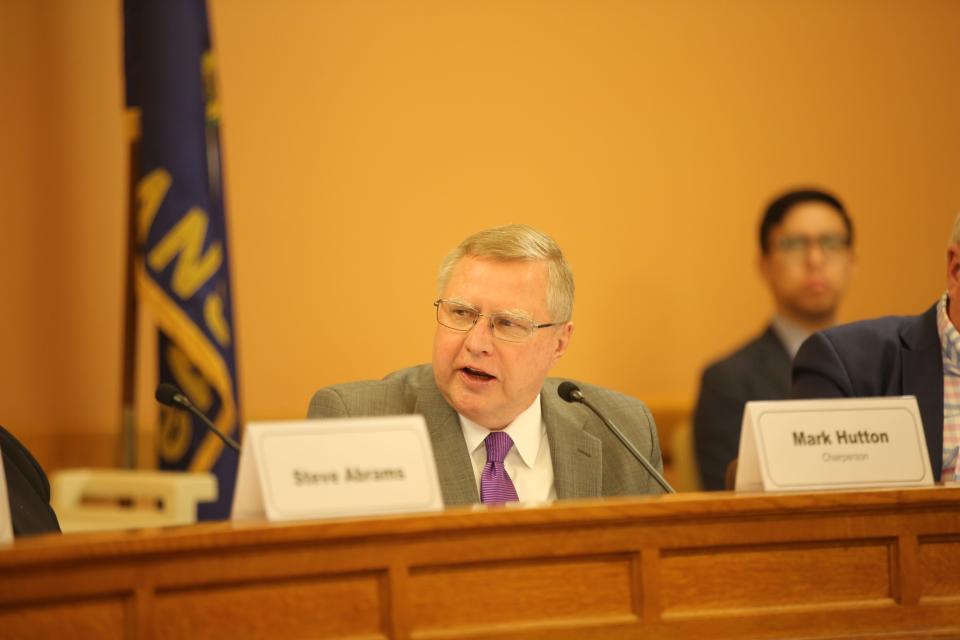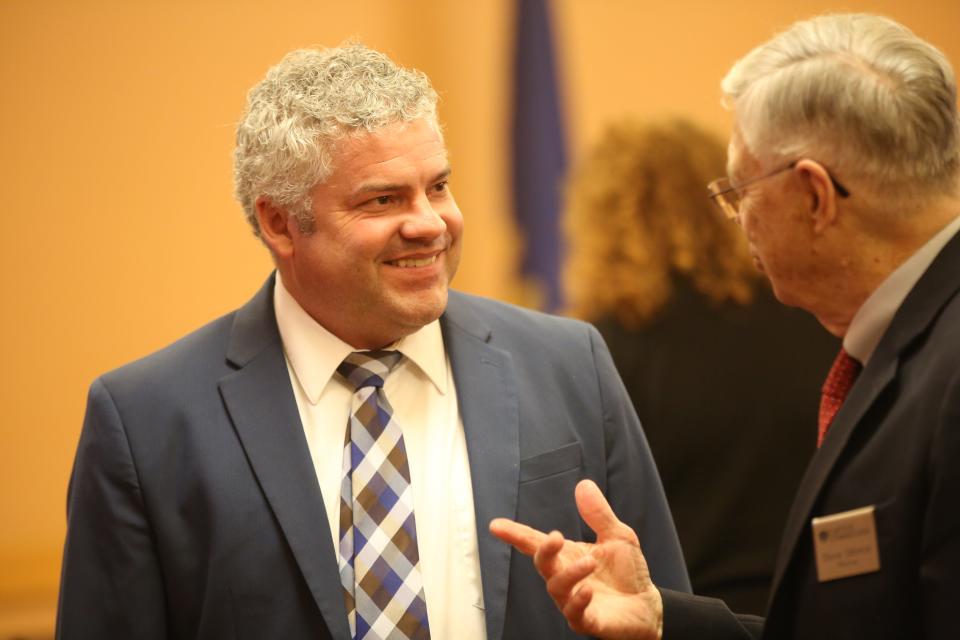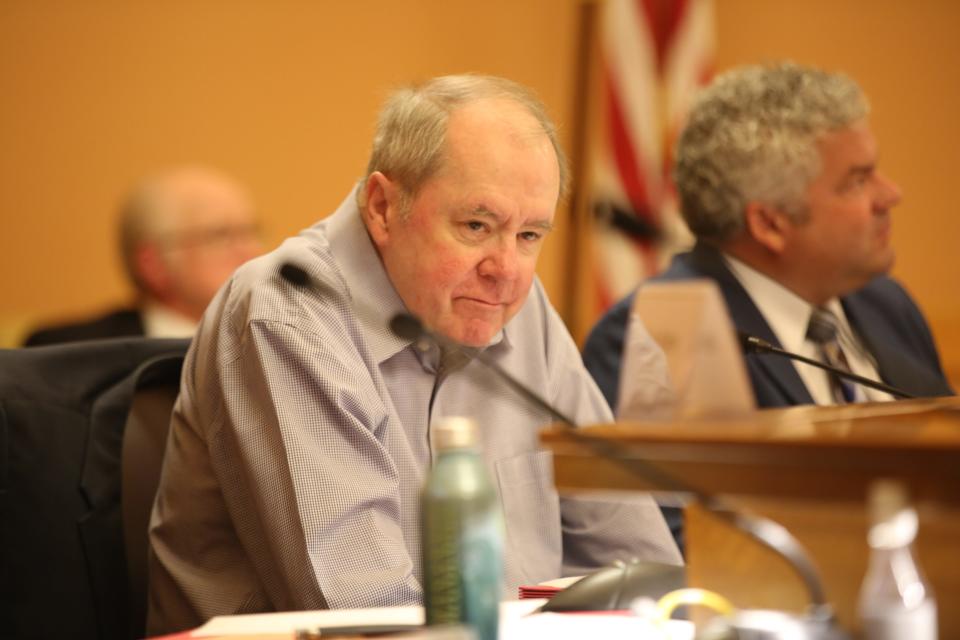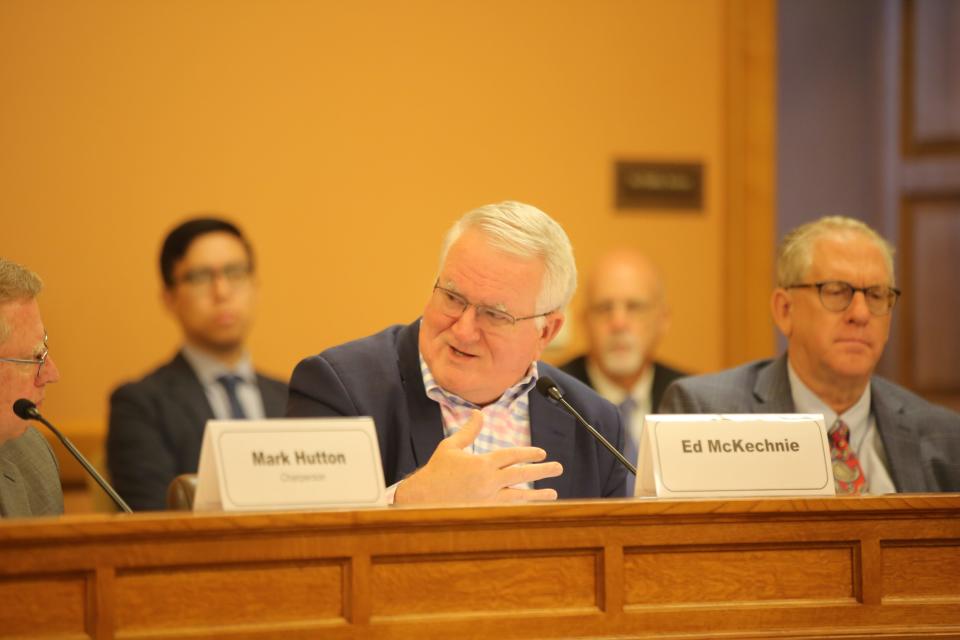Top Kansas lawmakers back pay raises — but not enough to incentivize career politicians
- Oops!Something went wrong.Please try again later.
The state's two top lawmakers will back a pay raise for poorly paid legislators — as long as it doesn't incentivize them to become career politicians.
Senate President Ty Masterson, R-Andover, and House Speaker Dan Hawkins, R-Wichita, told the Legislative Compensation Commission last week that they should find a balance when studying a pay raise for politicians.
"You have people that think this should be completely volunteer and people think it should be a high-paying career," Masterson said. "I think both of those people are wrong.
"I'd also encourage you not to incentivize it being a career for somebody. There is value in a citizen legislature and having to serve under your own rules. It avoids some of what's seen as rules for thee but not for me."

A more representative government in Kansas
The Legislative Compensation Commission tasked with deciding on legislative pay raises is comprised entirely of men who are current or former legislators, hold other political offices or are lobbyists.
Much of the impetus behind raising legislative pay is the argument that it would allow for a more representative government.
"I think we need to posture in a way that gets us the biggest bandwidth of the public to be able to serve," Masterson said. "The truth is, for years now, it's been a hurdle for large segments of our population even attempt and represent their neighbors in this way. So I would like to see us make that hurdle go away. However, I don't believe it should be a career. There needs to be some level of service."
Lobbyist Jason Watkins, himself a former legislator, introduced the bill to create the compensation commission on behalf of the Wichita Regional Chamber of Commerce.
"One of the reasons that we introduced this legislation is we believe in representative democracy," Watkins said. "The Legislature should look like a cross-section of the state of Kansas and folks from all walks of life should be able to serve."
Watkins said the only test for whether somebody should serve in the Legislature is if voters elect them, not whether they are independently wealthy or have a flexible job. Some legislators leave elected office because of the low pay, he said.
"Rep. Mario Goico used to joke when people would say the Kansas Legislature should should have term limits," Watkins said. "Mario would say",: 'Well, they do. It's called bankruptcy.' ... Nobody should get rich serving at any level of government, but people shouldn't have to go broke either — and that's the stark truth."
What should politicians be paid?

Neither Masterson nor Hawkins opined on what the pay level should be.
"I don't know what the answer is going to be," Hawkins said. "I don't have any preconceived notions of what you're going to come up with."
Watkins shared his opinion.
"Since I don't ever have to run for office and don't ever plan to run for office again, I'm just going to take the risk of telling you I think these legislators ought to be paid somewhere in the range of the $45,000 to $50,000," Watkins said.
He said that would be adequate enough for "people from all walks of life can can serve if voters are willing to send them to Topeka," but not so much that it incentivizes somebody to become a career politician.
It would also put Kansas more in line with neighboring states.
The Kansas Legislative Division of Post Audit in 2019 found that a typical Kansas lawmaker is paid about $21,900 a year. That's less than some other part-time legislatures as well as Oklahoma's $50,800, Missouri's $48,800 and Colorado's $43,500 while but slightly above Nebraska's $21,000.
More: Kansas legislators probably make less than you do. Should they change that in 2023?
Hawkins said that when he first ran for the House, he didn't know what the pay was.
"Then you come up there and you find out that there are a lot of costs to be away from home," he said. "So pay is certainly an issue. Legislative compensation has remained that continual discussion over all of these years and you know, for us here in Kansas, we're one of the lowest in the nation."
Hawkins said the time commitment is more than just the 90 days of a legislative session. During the rest of the year, a typical representative spends 15 to 20 hours a week on constituent services, meeting with local governments and attending community events.
Compensation commission member Anthony Hensley, a former Democratic representative and Senate Minority Leader from Topeka, agreed that 15-20 hours is about right for a representative. But a senator may work many more hours as they represent roughly three times as many people and likely more school districts, cities and counties.

Masterson urged consideration for higher expenses of those who live farther away from Topeka.
"It is different for those that live in the capital city versus someone who lives in Garden City," he said.
He also warned against incentivizing longer legislative sessions.
"When you make more money the longer you're there, that's kind of a perverse incentive ... and those long sessions are rarely a good thing," Masterson said. "I'm not sure I've ever been in one that was a good thing. Tensions run high and things get get off track."
Politicians delegate pay raise question to commission
Legislators delegated authority to the commission to determine what a pay raise should be. Masterson said he doesn't envy their challenge, and Hawkins said it would be easier for the commission to make a decision than the 165 legislators.
"This is a tough job that the Legislature just has a tough time doing," Hawkins said.
More: Kansas legislators could get a pay increase — but only if an independent body says so
The commission is chaired by former Mark Hutton, a former Republican representative from Wichita. He said he hopes the next meeting on Sept. 21 will narrow down the discussion on how to structure legislative pay.
At issue are base pay, if and how to index pay to inflation, Kansas Public Employees Retirement System benefits, per diem rates, varying geographical sizes of districts and premium pay for leadership roles, among other complexities.
Tom Hawk, a Manhattan Democrat who retired from the Senate last year, said it is not considered politically smart to advocate for increasing your own salary. Just before retiring, he introduced an ill-fated pay raise bill.

Ed McKechnie, a former Democratic representative from Pittsburg, said the House passed a pay raise in the late 1990s because they didn't take a roll call vote, though it ultimately did not become law.
"A lot of people looked like they were reaching for an air sickness bag that day, but it was the right thing to do," he said.
To help avoid future debates over pay, McKechnie wants there to be an automatic adjustment for future raises.
"Because bringing this up and talking about it all the time probably isn't the best public policy either," he said. "What legislators get paid should be the lowest thing on the newspaper, not the highest."
Jason Alatidd is a statehouse reporter for the Topeka Capital-Journal. He can be reached by email at jalatidd@gannett.com. Follow him on Twitter @Jason_Alatidd.
This article originally appeared on Topeka Capital-Journal: Legislators are paid poorly but Kansas politicians could see pay raise

